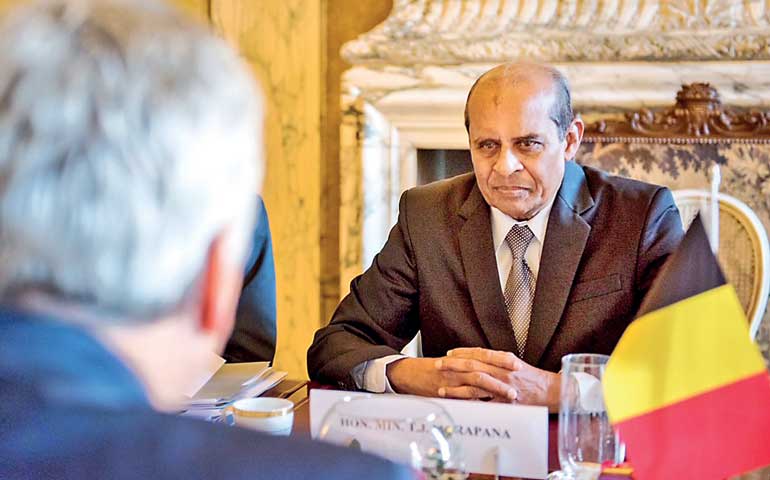Monday Feb 16, 2026
Monday Feb 16, 2026
Thursday, 5 October 2017 00:00 - - {{hitsCtrl.values.hits}}

By Sanja De Silva Jayatilleka
The 36th session of the UN Human Rights Council closed just a few days back, on 29 September. At that session, there were allegations of genocide, systematic discrimination, rape and torture in custody, extrajudicial killings and militarisation levelled at Sri Lanka besides a call by the UN High Commissioner for Human Rights Zeid al Hussein, for the second time in two sessions, for Universal Jurisdiction to be exercised. Universal Jurisdiction allows the courts of another country to prosecute a Sri Lankan citizen for alleged violations of crimes against humanity normally outside its national jurisdiction.
In reply, Sri Lanka’s official representatives (the representatives of the Sri Lankan State, appointed by the Government of Sri Lanka) in Geneva said nothing, according to the summary of the full proceedings provided by the United Nations Office in Geneva. By contrast in all these debates, other States which had accusations of violations of human rights used their ‘Right of Reply’ (an opportunity presented to States), to answer those allegation and to clarify any confusion. Sri Lanka did not.
The accusations came from the Non-Government Organisations. NGOs participate at these debates because the United Nations regards them as essential partners in the promotion and protection of Human Rights. To disregard their submissions is to set your country up for criticism by states who take the civil society/NGO submissions seriously, especially in the absence of a refutation by the country concerned, and therefore find them credible. The record of the 36th session shows no refutation by the Sri Lankan state.
On 26 September, at the general debate on Racism, Racial Discrimination, Xenophobia and Related Intolerance, no less than 14 NGOs spoke critically of Sri Lanka without a response from the Sri Lankan State.
The summary of the critical comments are as follows:

1.ABC Tamil Oli: Tamils in Sri Lanka were suffering from systematic discrimination island, withdraw all its armed forces from the Tamil lands.
2.ANAJA massacre of Tamil children in Sri Lanka on 14 August 2006 and of other attacks committed by Sri Lankan military forces. Called on the Council to allow the Tamils to conduct a self-determination referendum.
3.Association culturelle des Tamouls en France drew attention to the discrimination and violence against the Tamils in Sri Lanka, who had faced decades of political violence and disenfranchisement. The Tamils in that country wished to be granted their right to self-determination.
4.Association Bharati Centre Culturel Franco-Tamoul: The women headed households and war widows especially experienced socio-economic and physical vulnerabilities due to heavy militarisation.
5.Association Solidarité Internationale pour l’Afrique: Despite pledging to repeal the law (PTA) in the Human Rights Council, the Government of Sri Lanka continued to utilise this piece of legislation to discriminate and marginalise the Tamils.
6.Association for Victims of the World was concerned about the continuing patterns of religious violations and intolerance towards religious minorities that proved that ethnic communities did not have the right to their chosen faith without hindrance. Sinhala military demolished the memorial pillar of Thileepan.
7.Association des étudiants tamouls de France: The military forces of Sri Lanka had been in the territory since 1945. Many Tamil civilians had been detained without any charges.
8.Le Pont: Tamil nation was struggling for its freedom.
9.Alliance Creative Community Project: The Tamils were still struggling for equal opportunities. The present Government had detained numerous Tamil civilians without filing any charges against them.
10.Observatoire Mauritanien des Droits de l›Homme et de la Démocratie :The ethnic conflict in Sri Lanka had resulted in illegal and arbitrary arrests and detention, abductions and enforced disappearances, rape and torture in custody, extrajudicial killings and internal displacement of the Tamil communities.
11.Society for Development and Community Empowerment: Illegal occupation of the Sri Lankan military in the north and east. The military presence interfered in economic activities, education and cultural events of the Tamils.
12.Tamil Uzhagam: Tamils had been completely deprived of their basic rights by the racist Singhalese Government and subjected to genocide.
13.Association Thendral: North east of Sri Lanka remained a disproportionately heavily militarised region with five of seven Sri Lankan security force headquarters located in the two provinces of the region.
14.Tourner la page: Eelam Tamils continued to suffer discrimination despite the defeat of the Tamil Tiger Freedom Fighters.
The official Sri Lankan silence started on 11 September, the first day of the sessions. Despite criticism including from the High Commissioner, the Sri Lankan State stayed silent at the General Debate on the Oral Update of the High Commissioner for Human Rights.
This is a summary of the critical comments:
1.High Commissioner for Human Rights: The absence of credible action in Sri Lanka to ensure accountability for alleged violations of international human rights law and international humanitarian law makes the exercise of universal jurisdiction even more necessary.
2.Asian Legal Resource Centre: In countries like Myanmar, Bangladesh, Pakistan, Sri Lanka and India, Governments were engaged in systematic fanning of religious and fundamentalist sentiments against liberal, democratic and secular ideals.
3.ABC Tamil Oli: many countries had refused resettlement to Tamils who had been members of the Liberation Tigers of Tamil Eelam. Recognise the plight and dangers faced by the Tamils in Sri Lanka. The situation of Tamil refugees required urgent attention.
4.Association Bharathi Centre Culturel Franco-Tamoul: The Tamil people were still denied justice. The only way to assure justice was by international investigations.
5.Association Tourner La Page: The intelligence wing of occupying Sinhala military had instructed several village officials to submit written reports providing in-depth details on the whereabouts of former LTTE members. Ex members of LTTE were under military harassment and Sri Lanka police arrest without any charges.
On 27 September at the General Debate on Technical Assistance and Capacity Building, the Sri Lankan State’s silence was deafening, in the face of repeated accusations of 146,000 (one hundred and forty six thousand) killed in six months in a “genocidal war”!
This is a summary of the critical comments at this debate:
1.Tamil Uzhagam said Tamil fishermen of Tamil Nadu in India had been mercilessly attacked by the Sri Lankan Navy for the past four decades. So far, 578 had been shot dead, with their bodies thrown into the sea. On 2 April 2011, the Sri Lankan Navy had abducted four Tamil fishermen, and chopped up their bodies, thereafter throwing them into the sea. Due to the genocidal brutal attacks by the armed forces, more than 100,000 Eelam Tamils had come to Tamilnadu in India as refugees.
2.Tourner la page said that in 2009, Sri Lankan military forces had made a genocidal war against the Tamils by killing more than 146,000 people in a short period of six months. The Council should establish an international investigation into alleged violations of international humanitarian law and human rights, including crimes against humanity and genocide, by the Sri Lankan security forces during the conflict in Sri Lanka.
3.Association Bharathi Centre Culturel Franco-Tamoul said in 2009, Sri Lankan military forces had conducted a genocide war against Tamils by killing more than 146,000 people in a short period of six months.
4.Association des étudiants tamouls de France said countries such as the United States, the United Kingdom and India used the question of Sri Lanka to resolve their own regional interests and had made military agreements with the genocidal Government of Sri Lanka.
5.Le Pont: The Association expressed serious concern about the threats and intimidation which appeared to be linked to the Sri Lankan military who had come to the Council session.
6.Association culturelle des Tamouls en France said reconstruct societies affected by war, such as the north and east areas of Sri Lanka, the historical territory of the Tamil people. Concerned about the threats and intimidation which appeared to be linked to former Sri Lankan military staff who had come to the Council as non-governmental organisations, and who had started a social media campaign against the Tamil rights activists from Sri Lanka.
On 26 September at the General Debate on the Vienna Declaration and Programme of Action, Sri Lanka was accused of Genocide, Racism, Land Grabbing, and Militarisation. The Sri Lankan State said nothing. Interestingly, there were several assertions of the right of self-determination.
These are the critical comments at this debate:
These summaries indicate the dominant narrative being disseminated to the international community by way of the UNHRC sessions, by a number of NGOs regarding the conditions of the Tamil people in Sri Lanka. It is hardly surprising that the UN High Commissioner and the Human Rights Council tend towards this narrative when not a word in defence of Sri Lanka is uttered by our designated representatives in Geneva!
By default as it were, the only dissenting voice at these debates was that of a NGO called International Buddhist Relief Organisation. Theirs was one perspective and was by no means adequate to prevail over the numerous opposing submissions. There is no substitute for effective defence of the country by the accredited representatives of the State.
Even in 2007-2009, when Sri Lanka gained overwhelming support of the Council, some in the Foreign Ministry stood by a notion that a State doesn’t need to reply to NGOs, which probably derived from and applied in the old days, before NGOs were given consultative status at the Council. However, during 2007-2009, it is by going against this advice and responding to every single statement by NGOs that the Permanent Representation in Geneva, with the active participation of delegates from the Peace Secretariat and the Attorney General’s office that Sri Lanka, managed to get a two-thirds support for its resolution, decisively convincing the international community of its case.